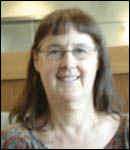Lee Rowen

1. What is your educational background?
PhD. in Biochemistry at Stanford University
PhD. in Philosophy at Vanderbilt University
2. Why did you choose to go back to school and get your PhD. in Philosophy?
Lee's experience in Stanford was very demanding and stressful and she lost interest in her work. “I basically lost confidence in my ability to do research. Just the idea of running a lab, getting grants and dealing with graduate students freaked me out.” Lee reconsidered what she was doing, and felt that she should study philosophy, another interest she had. She then taught at Caltech University for three years.
3. Does philosophy complement your work here?
Her knowledge in philosophy increases sensitivity to language and helps her organize and characterize information. It helps her gain an insight into structuring thoughts and framing questions. “’Knowledge is to wonder,’ that is what Aristotle said. And what I think science is about is to maintain that capacity to wonder.”
4. How did you come here to ISB?
After her job at Caltech ended, she started as a Post-Doc in Dr. Lee Hood’s lab. She started as a Post-Doc and became a Research Associate. Then, she moved to Washington State and became a Senior Staff Scientist, then Senior Research Scientist.
5. What are the different opportunities to work as a scientist?
“It depends on what your goals are.” Now one opportunity is to work as a lab technician. Their job is to implement experiments and get the data. “Lots of analysis of data and troubleshooting.” “If you are engineering inclined, you can try to develop instrumentation.” Another option is computational biology, “bioinformatics”, who like to work with data and use computers.
6. What is your role in Lee Hood’s lab?
For Lee, it has changed over the years. She started as a post-doc in Lee Hood’s lab, and later she also worked on the Human Genome Project. After she switched over to sequencing under Dr. Lee Hood’s request, that started her on her “adventure with the genome project.” After the Human Genome Project was over, she was not sure what to do, since the project was a large part of her life. So she “reinvented myself as kind of like ISB Den mother in a way”, managing Lee Hood’s lab and organizing events.
7. Side notes:
--“There are various ways things that can go wrong in research. I can distinguish three ways right of the bat:
|
"You make a stupid mistake… in which case, you can have the confidence that when you redo the experiment it’s going to work because you know what you did wrong…That’s the easiest kind."
"Technical difficulties: that’s when the technology you are using to solve the problem can’t solve it."
“Third type is conceptual mistake, where you are going about it wrong and you don’t know that you're going about it wrong. There is a disconnect between the assumptions you are making about the parameters of the problem and the assumptions you should be making.” |
--“People say, ‘when opportunity knocks, you have to take it’ which is true, but you know, opportunity knocks lots of times… You can’t take an opportunity every time it comes. When you’re in a particular chapter in your life, you should see what the chapter has to offer. When the chapter no longer makes any sense, you should do something else.”
|

